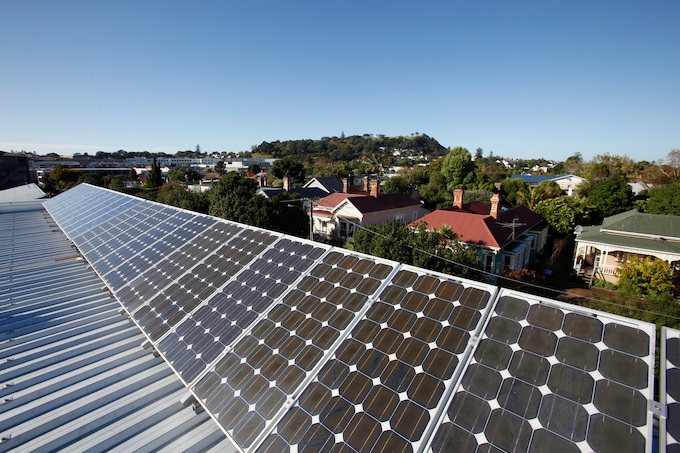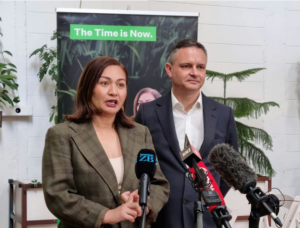
Greenpeace has welcomed the Greens for being the first party to announce a household solar policy for Aotearoa New Zealand’s election in October, but says the party’s stance in post-election negotiations will make all the difference to addressing the climate crisis.
The Green Party announced its Clean Energy Payment policy today which would see homeowners receive up to $6000 in grants and up to $30,000 in zero interest loans to help install insulation, heat pumps and household solar.
The Greens have also pledged to make low-carbon upgrades tax deductible for landlords so that renters can benefit.
- READ MORE: Climate crisis: ‘Everyone was in panic mode’: Lāhainā resident tells of wildfire escape
- Greens announce climate-focused clean power policy
- Aotearoa New Zealand green policies
The Greens’ Zero Carbon Homes upgrade is planned to:
- scale up solar on Kainga Ora homes to 30,000 more households in the next three years,
- expand Warmer Kiwi Homes to cover more zero carbon upgrades such as replacing gas heaters, and
- fund Community Energy providers and by Māori, for Māori approaches.
Grants could be used to cover 25 percent of the cost of things like better insulation; replacing fossil-fuel appliances, like gas heaters, with clean alternatives, like heat pumps; and to purchase rooftop solar power, reports NZ News.
The funding would come from revenue from the Emissions Trading Scheme, through the Climate Emergency Response Fund.

Green Party co-leader James Shaw said while people struggled with energy challenges, the planet was heating “at frightening speed”.
A ‘clear answer’
“There is a clear answer staring us in the face: warm homes powered by clean, cheap, low-carbon energy, supplied straight from our roofs,” Shaw said.
“The Clean Power Payment is as close to a perfect investment as you can get: slashing soaring bills for families, slashing emissions, and creating thousands of good jobs,” he said.
“Most people want action on the climate crisis and action on the cost of living.”
Greenpeace Aotearoa spokesperson Amanda Larsson said: “Greenpeace has for years been calling on political leaders to commit to solarising New Zealand as a way to replace climate-polluting fossil fuels and give regular people more control over their energy.”
More than 30,000 people have signed a Greenpeace petition calling for government investment in household solar.
“We are pleased to see the Greens take up the gauntlet with this policy announcement. It’s common sense and something that many New Zealanders say they want.
“But, to date, New Zealand has really lagged behind our peers when it comes to helping households make their own clean power from the sun.”
Parties ‘need to be ready’
Larsson said the climate crisis was here, and that political parties should be ready for this year’s election to be a climate election as New Zealanders demanded political climate leadership.
“People across Aotearoa have borne the brunt of the climate crisis this year, from Cyclone Gabrielle in the north, to severe drought in the south.
“We are all watching in real time as climate disasters unfold around the world, whether it’s extreme heat and severe floods to the horrendous fires currently happening in Hawai’i.”
Larsson also says that, when it comes to climate change, it’s important to remember that it’s not all about renewables.
“Here in New Zealand, we have too many cars and too many cows. Intensive dairy is New Zealand’s most polluting sector, closely followed by road transport.
“Any political party that is serious about climate change also needs to come to the table with ambitious policies to regulate big dairy and divert road spending towards more rail, public transport, walking and cycling.”
Larsson added that the Green Party’s’ ability to address climate pollution if in government would ultimately come down to what they choose to prioritise in any post-election negotiations.














































